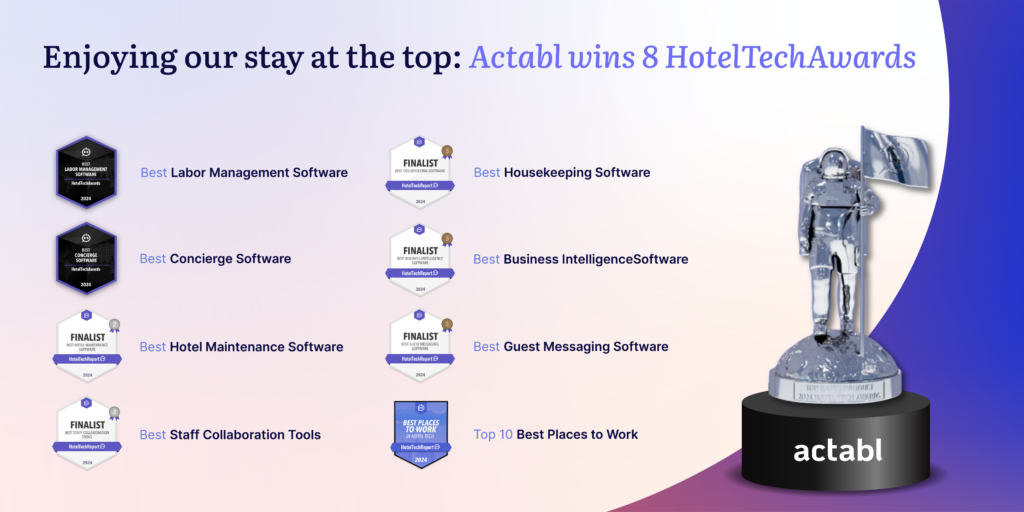
Mobile Service On-Demand Delivery for Cities: A Hotel Is Like A Little City (Part 1)
We’ve talked about the challenge of mobile service on-demand for hotels, but how does this apply to a city?
ALICE’s CTO Dmitry Koltunov has been invited to present ALICE at the Global City Teams Challenge (GCTC) Expo in Washington, D.C. next week. Organized by US Ignite and the National Institute of Standards & Technology (NIST), GCTC is an international showcase of Smart City and Internet of Things technologies.
So why is a hotel technology startup speaking at a Smart Cities expo?
In front of a diverse audience of mayors, CIOs, CTOs, government representatives, educational institutions, non-profits and the media, ALICE will make the case that a hotel is much like a little city. A general manager is like the mayor, each facility is like a municipality, and each guest a citizen. The inner workings of a hotel have a lot of logistical complexity and ALICE provides a very elegant solution.
Global Cities believes that the work that ALICE is doing with our partner hotels is a model for how governments can embrace mobile technology to connect with their citizens in today’s Smart Cities. We also believe that mobile service on-demand technology is a general theme that applies to any hospitality-like situation where guests and staff need to interact in real time. Perhaps a unified mobile platform can transform not only hotel operations, but the workings of a city’s municipalities as they service their citizens.
Today, we present Part I of our a prelude to the presentation.
Hospitality is a significant part of the economy of our cities. Improving the efficiency, responsiveness and profitability of a city’s many hotels, residences, workplaces, hospitals and f&b services can positively impact a city’s economic standing.
But improving hotel operations is no small task. In fact, hotels exhibit similar operational complexities to a city. There are many departments, often siloed from one another, spread out over distances and all communicating through many different and disparate communication platforms. This presents significant challenges of both transparency and accountability. Additionally, guests, like citizens, have their own expectations as to how they want to communicate, now that the on-demand economy and mobile devices have reshaped expectations toward communication and immediate service delivery. Indeed, hotel operations, like city government, is more often that not beset with legacy structures, processes and tools that are at odds with mobile service delivery and the improvements it brings.
The rise of mobile brings new opportunities for hotels, just like it does for cities. Numbers vary by region, but for many cities, smartphone penetration is well above 70%. Likewise, an estimated 75% of travelers travel with one or more devices, and that percentage is considerably higher for younger generations. And our time spent on these devices only continues to rise. Last November, Americans passed a milestone, spending more time glued to a mobile screen than a television.
With changes in behavior regarding mobile devices come changes in expectations. Earlier this month, the Wall Street Journal confirmed that, yes, there is now an “Uber for Everything” – tech-speak for the business model that supplies users any service X with just the push of a (smartphone) button – a mobile-fed phenomenon that could not have existed even a few years ago. Today’s smartphone or tablet, which combines sensors, location, cameras, payments, social platforms and frictionless access is today’s dominant operational platform, and hospitality, which trades in the business of getting people what they want when they want it, is working hard across all verticals to leverage mobile and service on-demand technology to deliver on the new expectations and operational paradigms of the day.
We’ve talked about the challenge of mobile service on-demand for hotels, but how does this apply to a city? Much like a hotel, a city is operationally complicated (take NYC: there’s the mayor, the borough administrations, the city council, the community boards, the departments, the agencies, and the constant oversight and governance of the state), spatially disparate, and requires communication both between government representatives/departments, as well as between government and its citizens
Both government and citizens want insight into how their concerns or requests are being handled, and the interaction model is wrought with lots of overhead and friction. A citizen’s or neighborhood’s issue or request might be the domain of one specific agency, but ultimately it’s the city that is accountable for ensuring the smooth operation of all of its agencies (at a hotel, a guest request might pertain only to the housekeeping department, but if that request is mishandled, it’s the responsibility of the hotel to fix it).
All of the companies presenting at the GCTC Expo have helped improve city operations and the relationship between government and its citizens. Verizon and Cisco, for example, provide the infrastructure that makes mobile operations a reality. IBM has a whole division dedicated to Smarter Cities. And Qualcomm powers the innovation that has put veritable supercomputers in our pockets (a new iPhone CPU has 625 times more transistors than a 1995 Pentium).
ALICE leverages this innovation to create mobile service on-demand. Our technology is sophisticated enough to facilitate seamless and trackable communications when the simple point-to-point dispatch model exemplified by Uber isn’t sufficient to transform the multi-touch complexity of hotel guest-staff – or indeed, government-citizen – request management.
Many cities have made great strides in recent years to try to meet their constituents expectations around mobile, developing citizen-facing apps and opening public data to developers to encourage homegrown technological solutions to challenges of local government. In Part II, we’ll look at city efforts here more in depth and how ALICE’s mobile service on demand technology could make a difference.







